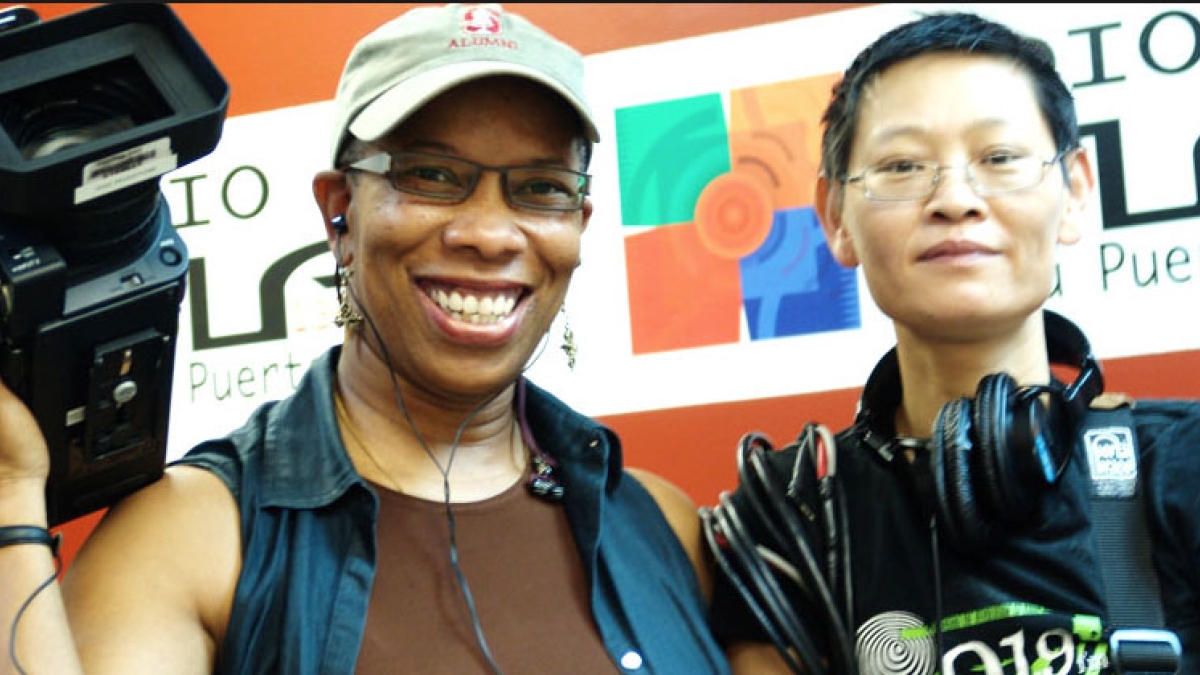Professors' film to debut at Local to Global Justice Teach-in

“Not everything of value is for sale” is one of the enduring messages of a new film by H.L.T. Quan and C.A. Griffith, award-winning filmmakers and ASU professors, that will premiere this weekend at the Friday night kick-off event for ASU’s 11th annual Local to Global Justice Teach-in.
Each spring ASU’s Local to Global Justice Teach-in offers a festival-like forum for sharing knowledge about social justice, human rights and sustainability issues.
The festivities are scheduled to begin at 5:30 p.m., Feb. 24, in Neeb Hall, on ASU's Tempe campus, and will include music by Native American artists “Artificial Red,” the film screening, and a Q&A session with Quan and Griffith.
Quan and Griffith’s newest documentary, "América's Home," is about gentrification, displacement and popular resistance. It is the story of América Sorrentini-Blaut, a feisty Puerto Rican woman in her 70s, living on a fixed income in Chicago, who struggles to restore her mother’s home in the rapidly gentrifying Santurce neighborhood of San Juan, Puerto Rico. Aided by a group of her contemporaries, she and these “retired” construction workers and artisans painstakingly restore the house and transform it into Casa Sofia, a cultural center named in honor of América’s mother. When developers offer her $2 million to bulldoze Casa Sofia to build exclusive condos, she refuses.
The film is a narrative and metaphor about pushing back to gentrification and unbridled development, and creating spaces for community organizing and art.
Quan is an assistant professor of justice and social inquiry in the School of Social Transformation, and Griffith is an associate professor in the School of Theatre and Film in the Herberger Institute. They are co-founders of QUAD Productions, a nonprofit media collective focused on the research, development and production of film and video projects that support and effect progressive social consciousness. Together they produce short- and feature-length social justice themed documentaries and provide media training to progressive community organizations.
The documentary, completed in summer 2011, was filmed over a four-year period in 12 different communities, from Chicago’s Lincoln Park to a number of historic neighborhoods in San Juan. Quan says the roots for the film go back even further.
“I came to know América (Meca) Sorrentini-Blaut from my previous work as a faculty member of the Urban Studies Program in Chicago (Associated Colleges of the Midwest) and my research on popular resistance in Chicago,” says Quan. “From that research and community involvement, I learned that Meca was a major figure in the city's politics and Puerto Rican community.
“I subsequently assigned several of my students to conduct truncated oral histories of Meca's life for a course on community research,” she says. “Several years later, I decided to conduct my own extended oral history on Meca. While in San Juan doing the oral history, I and my co-director/producer C. A. Griffith interviewed a number of community activists and artists and decided that ‘América's Home’ would be a compelling subject of a feature-length documentary.”
This year the focus of the teach-in is “Dialogue for Healing and Renewal: of the Self, in the Community, for the World.”
“We are thrilled that the filmmakers chose our event for their premiere,” says Beth Swadener, a professor in the School of Social Transformation and organizer of the annual Local to Global Justice Teach-in. “The film addresses ways that activists can be supported against many odds, and the roles that community spaces play, which fits well with the theme of this year’s teach-in. We are also pleased that any donations at the film showing will benefit both Local to Global Justice and UNIDOS – student activists from Tucson.”
In addition to Friday’s film screening in Neeb Hall, the teach-in runs all day Saturday and Sunday, Feb. 25-26, with events in and outside the Farmer and Payne Education buildings on the Tempe campus. Saturday’s keynoter is Randall Amster, professor of peace studies at Prescott College; Sunday’s keynoters are the youth-led coalition UNIDOS and spoken word artist Karen Anzoategui. The entire slate of teach-in events are free and include workshops and discussions, plenary sessions, performances, vegan and vegetarian food, activities for children, yoga and meditation, art and music.
For more information about the Local to Global Justice Teach-in and a full schedule of events, visit localtoglobal.org.